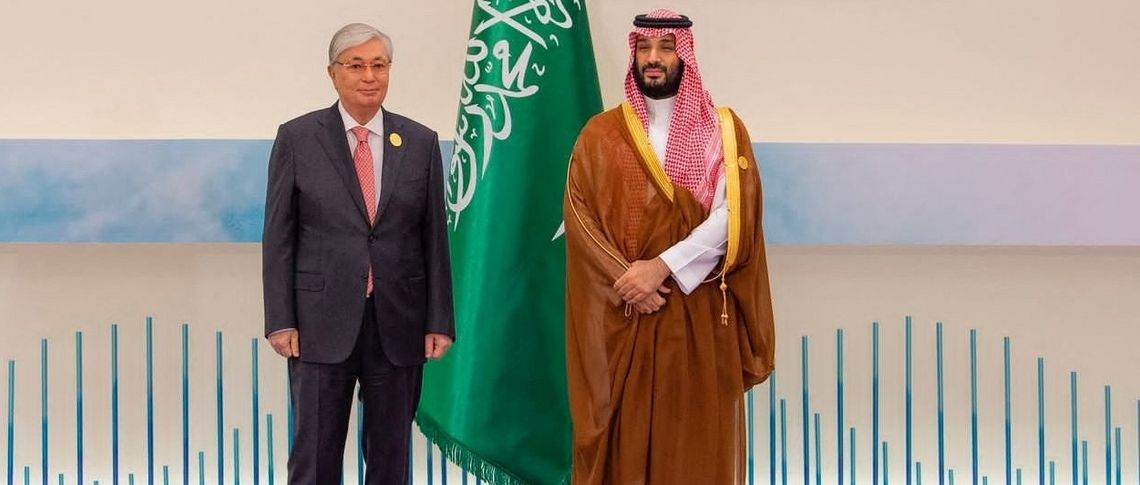Last month, Kazakhstani President Kassym-Jomart Tokayev participated in the first Gulf Cooperation Council (GCC)-Central Asia (CA) summit held in Saudi Arabia. In particular, Astana was interested in improving its cooperation and trade with Riyadh, hoping to somewhat reduce its dependency on neighbours like China and Russia – while Saudi Arabia wants to expand its influence and presence in Central Asia. In this context, it is helpful that Saudi Crown Prince Mohammed bin Salman’s (MBS) vision of increasing his country’s global presence coincides with Kazakhstan’s famous multi-vector foreign policy of establishing global partnerships. Whether more trade, investment and common foreign policy objectives can help bilateral relations evolve into an Astana-Riyadh alliance is an intriguing question.
Opportunities for mutual benefit
During his remarks to his fellow heads of state at the GCC-CA summit, the Kazakhstani President noted that ‘the Gulf countries, with their huge political influence, and economic and investment potential are our most important partners in many key areas.’ Trade is particularly important. ‘Kazakhstan is ready to increase its exports to the Gulf countries in the shortest possible time for 100 commodity items to... about $400 million’, Tokayev emphasised. He further highlighted how, since achieving independence after the dissolution of the Soviet Union, ‘the Gulf countries have invested about $3.6 bn in the economy of Kazakhstan’, particularly in the trade, transportation and energy sectors. The logistics company Dubai Ports World owns stakes in two special economic zones in Kazakhstan, for instance.
Anecdotally, on 17 August, President Tokayev and Saudi Minister of Environment, Water and Agriculture Abdulrahman Al-Fadhli met in Astana. ‘Food security is a big problem worldwide today. We sincerely believe that Kazakhstan has every opportunity to become a key player in this area’, said the Saudi minister. Moreover, during Al-Fadhli’s visit, the ‘importance of agriculture as a strategic economic sector for both countries’ was also highlighted. Sulaiman Alrumaih, the CEO of the large agricultural Saudi company SALIC, reportedly expressed interest in opening a meat production facility in Kazakhstan. As food security becomes an ever-growing problem due to climate change, geopolitical tensions and the global consequences of the war in Ukraine, Astana is looking to offer food-related products and investment opportunities to Saudi Arabia.
Established in 2014, the Middle Corridor has grown in importance for trade since the war in Ukraine commenced as a means to bypass Russia.
During his speech at the summit, President Tokayev also praised the Astana-headquartered Trans-Caspian International Transport Route (TITR), commonly known as the ‘Middle Corridor’, and was optimistic about its future. ‘We intend to systematically increase the cargo flow through this route and bring it to 500,000 containers per year by 2030’, he explained.
Established in 2014, the Middle Corridor has grown in importance for trade since the war in Ukraine commenced as a means to bypass Russia. Trade traffic begins in Kazakhstan, crosses the Caspian to Azerbaijan, Georgia, Turkey (the Corridor’s other members) and then to the European and international markets. The Corridor’s success – delays and infrastructure limitations notwithstanding – means that companies from China to Uzbekistan want to utilise this network grid to move their goods.
Since the war in Ukraine will not end anytime soon, and Russia’s international isolation will continue, Astana is looking to maintain its leadership role in the Corridor, given its rising importance for commercial and energy transportation. Thus, the Kazakhstani government is likely looking for Saudi investment in the Corridor. From the Saudi point of view, investing in the Corridor-related transportation infrastructure like Kazakhstan’s Aktau port could be profitable should the Corridor continue to be in high demand. Similarly, Astana wants to reassure Saudi Arabia (and other GCC countries) that goods such as food products can be delivered from Kazakhstan and other neighbouring Central Asian states via the Corridor.
The Kazakhstani government has stated that it will respect international sanctions but will not jeopardise the profitable bilateral trade with Moscow.
The appeal for more trade and investment may sound perfunctory, but also logical. Russia’s invasion of Ukraine and international sanctions against Moscow have pressured Russia’s immediate neighbours, particularly, to comply with said sanctions. The Kazakhstani government has stated that it will respect international sanctions but will not jeopardise the profitable bilateral trade with Moscow. This strategy is understandable since Astana-Moscow bilateral trade reportedly reached $26 bn in 2022.
Attracting more Saudi trade and investment would be very helpful to diversify trade away from Russia – and China, Kazakhstan’s other key partner and investor.
Moreover, energy production – oil, gas, and uranium – is the cornerstone of the Kazakhstani and Saudi economies, which means that there is ample room for both governments to work together to promote energy-related objectives that the two countries support.
Astana is also closely monitoring Saudi Arabia’s nuclear power program. Riyadh has announced plans to use domestically-sourced uranium. However, as a global producer of uranium, Astana and its energy company Kazatomprom would undoubtedly like to supply Kazakhstani uranium to Saudi Arabia’s future nuclear plants.
Saudi Arabia’s new role in the world
With Crown Prince MBS, Saudi Arabia is more eagerly engaging with the world and not solely the Arab world. As Dr. Tobias Borck explained, ‘Saudi Arabia has recalibrated its foreign policy, continuing to focus on the same overall objective of supporting ‘Vision 2030’ but looking to leverage Saudi instruments of power in a more patient and pragmatic manner.’ This evolving strategy includes ‘working with alternative partners where suitable, even in the face of criticism from Washington or other Western capitals’, including China.
There have been no statements from Moscow regarding the GCC-CA Summit. However, the Russian government likely views a deeper relationship between Astana and Riyadh with less concern than stronger Astana-Washington or Astana-Brussels relations. Riyadh and Moscow have generally good relations, mainly due to a friendship between President Vladimir Putin and Crown Prince MBS; the two leaders had a telephone conversation as recently as 27 June.
While a ‘special relationship’ à la Israel and the United States will not occur anytime soon, closer relations between Astana and Riyadh should be monitored, given their similar foreign policy objectives and ambitions. For now, Astana’s primary interest is attracting Saudi trade and investment. But the two governments also have common foreign policy objectives, such as increasing their global image and supporting peace negotiations in Ukraine.
Whether these common strategies, interests and objectives are enough to ‘bring bilateral ties to a new level’, as Tokayev reportedly told MBS in their July meeting, remains to be seen.






